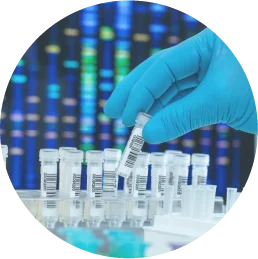What is a PSA test normal range? What is a dangerous PSA level?
When you or a loved one receive a PSA score, some of the first questions that come to mind are, “Is this normal?” and “What now? Do I need to take action?”
The answers to those questions depend on your age and a few other factors. You’ll find a “normal” PSA ranges by age calculator below, as well as a table listing them out. We’ve also provided information to help you understand what the range means.
PSA, the Prostate-Specific Antigen
The prostate is a walnut-sized gland found between the bladder and the rectum in males. Its primary job is to produce seminal fluid. The prostate creates a protein, the prostate-specific antigen, or PSA. A PSA screening test is a blood test approved by the FDA in 1994 to measure the levels of PSA in a man’s blood.
Small amounts of PSA ordinarily circulate in the bloodstream and can be measured by a PSA test to monitor the health of the prostate. This test is intended to screen for prostate cancer, find other prostate-related conditions, or monitor PSA levels in those in treatment for prostate cancer. This is a simple blood test which reports PSA levels as nanograms of PSA per milliliter (ng/mL) of blood.
Normal PSA Range Finder
Enter Your Age and PSA Score (ng/ml)
Take the Next Step
Discover how our treatments get you back to living, with lower risks of impotence and incontinence.
When You Should Screen For PSA Levels
Colloquially, prostate cancer screening is thought to be routinely undertaken by men over the age of 40. The American Urological Association recommends the following:
- Men under 40: No screening – there is no evidence to suggest a benefit of screening under 40
- Men aged between 40 to 54: No screening if you’re at average risk. If you’re at a high risk (such as having a family history of prostate cancer), the decision should be made by yourself and your doctor.
- Men aged between 55 to 69: Screening with doctor approval. This is the age group is identified as having the greatest benefit of screening
- Men aged over 70 or less than a 10-15 year life expectancy: Routine screening not recommended unless you are in excellent health where they may be benefit
Factors That Affect PSA Levels
It is important to note that PSA levels can rise naturally with age, and that a number of benign (not cancerous) conditions can also affect PSA levels, such as prostatitis (inflammation of the prostate), benign prostatic hyperplasia (BPH, enlarged prostate), urinary tract infection (UTI), or even injury to the prostate.
Other factors such as sexual activity right before testing, certain exercises, or even diet can impact the PSA levels as well. It is essential to consult a doctor regarding the meaning and next steps of your PSA testing results.
Understanding PSA Levels
What is a normal PSA level? What is a dangerous PSA level?
- If your PSA levels are between 0 and 2.5 ng/mL, prostate cancer is not likely and there is a low chance that you would require further testing.
- A PSA level between 2.5 and 4.0 ng/mL is generally considered normal. In the absence of other risk factors, if your PSA levels aren’t fluctuating, and if you aren’t taking medication for BPH, your doctor may decide that no additional testing is needed until your next annual physical.
- If your PSA levels are over 4.0 ng/mL, or if they are rising, your doctor may wish to order additional testing to rule out other conditions. For example, a urine test might help check for a urinary tract infection. Although PSA levels between 4.0 and 10.0 are considered “suspicious,” there is only a 25% chance that you have prostate cancer.
- If your PSA levels are 10 ng/mL or higher, these levels are considered “dangerous.” This means your chances of having prostate cancer are 50%.
Is your PSA level high?
Get a consultation with a HALO Diagnostics prostate expert by clicking the button below.
Normal PSA Levels By Age Chart
What is a normal PSA level by age? We mentioned earlier in this article that PSA levels increase with age due to age related growth of the prostate gland. A doctor will therefore take into account an age-adjusted PSA level when discussing your prostate health:
| Age Range (years) | Baseline Age-Adjusted PSA Levels ng/mL |
| 40 to 49 | 0 to 2.5 |
| 50 to 59 | 0 to 3.5 |
| 60 to 69 |
0 to 4.5 |
| 70 | 0 to 6.5 |
Although there are “normal” PSA levels by age range, it is still important to screen routinely (as instructed by your doctor) to ensure these “normal” levels are not rising.
How PSA Results Are Used For Diagnosis
In the past, many doctors wanted men with elevated PSA and/or an abnormal digital rectal examination to undergo a prostate biopsy. Today, this is not a course of action recommended by the American Urological Association. In such cases, multiparametric prostate MRI (mpMRI) is now recommended as the best front-line test to detect–or rule out–prostate cancer.
If a mpMRI shows a suspicious finding, a MRI-guided biopsy is the most accurate way to perform a biopsy of the prostate. If this is not possible, an MRI can be used with an ultrasound-guided biopsy. This is referred to as a “fusion” biopsy, and is more accurate than an ultrasound biopsy alone.
| PSA level (ng/mL) | 0 to 2.0 | 2.0 to 4.0 | 4.0 to 10.0 | Greater than 10.0 |
| Prostate Cancer on biopsy (%) | 10% | 25% | 17%-32% | 43-65% |
How To Get A PSA Test
Consult with your general practitioner or urologist about receiving a PSA test in their offices. PSA tests are typically covered without co-pay or deductible by Medicare once a year for men 50 years and older. Many states now have laws which require private health insurers to cover the costs for PSA testing. However, additional PSA test costs may need to be covered by the patient.
For those without insurance, or for those with insurance that does not cover PSA testing, free tools are available through advocacy groups, such as ZERO.
ZERO National Free Testing Map
Companies such as imawaretm also offer in-home PSA testing kits and telemedicine appointments to discuss your PSA test results with a licensed physician. All imaware test kits are easy to use. After registering the test kit online, results will populate in the secure patient portal within 5-7 business days. You can submit your receipt of this test to insurance for potential reimbursement.
“At-Home testing is now at a point where results can be provided accurately and quickly within 5 business days, with real physicians providing telemedicine support through the entire testing process”
Dr. Diamandis – Lunenfeld-Tanenbaum Research Institute, Sinai Health System




